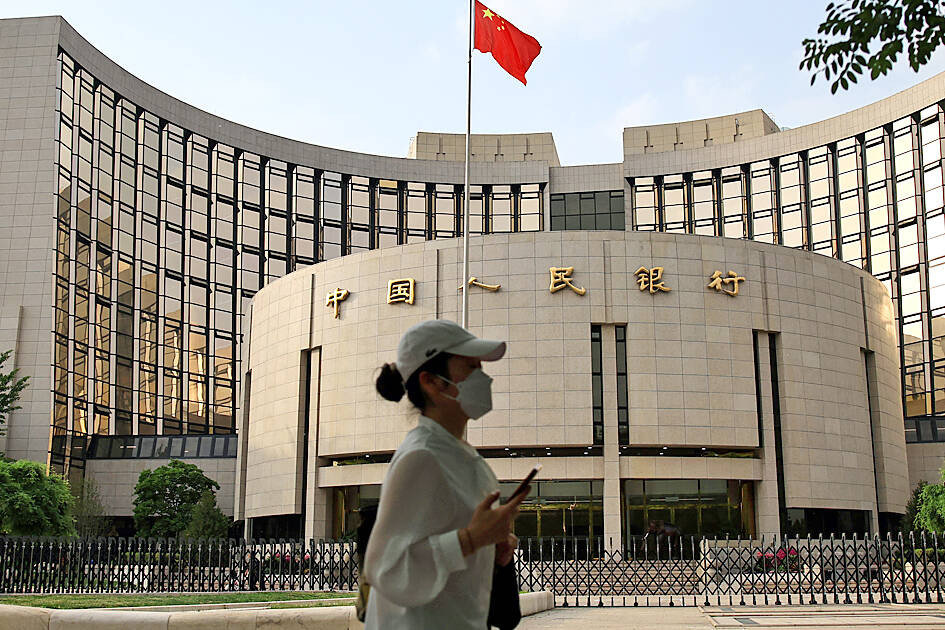China has reduced its policy rate and lowered the amount of cash lenders must keep in reserve, as Beijing ramps up efforts to help an economy caught in a second trade war with the US.
The People’s Bank of China (PBOC) cut the seven-day reverse repurchase rate to 1.4 percent from 1.5 percent, PBOC Governor Pan Gongsheng (潘功勝) said at a briefing yesterday.
The central bank would also trim the reserve requirement ratio (RRR) by half a percentage point, he said.

Photo: EPA-EFE
Pan’s announcement came hours after China said it would hold its first trade talks this weekend with US officials since US President Donald Trump unleashed a 145 percent tariff on most Chinese goods.
The latest steps aim to guide borrowing costs lower and are among the 10 measures outlined by Pan, which also include rate reductions on a slew of relending tools and loans for policy banks. The RRR cut would release about 1 trillion yuan (US$139 billion) in long-term liquidity, Pan said.
The seven-day reverse repo cut would go into force today, and the RRR reduction a week later, the PBOC said in separate statements.
Pan reiterated that officials would implement a “moderately loose” monetary policy, which would translate into ample liquidity and ensure funding with relatively low financing cost.
The RRR cut could enhance the stability of bank liabilities, he said.
“The monetary package is stronger than we expected. It is a powerful signal that policymakers are committed to boosting sentiment and shoring up growth. The PBOC’s steps get the ball rolling. It’s important that the government follows up — fiscal measures are more central for stabilizing the economy, and we anticipate more measures to come,” Bloomberg Economics analysts David Qu (曲天石), Eric Zhu (朱懌) and Shu Chang (舒暢) said in a note.
China has pledged to shift to domestic demand to maintain growth, as Trump’s tariffs threaten to cripple trade with the US. Exports could well contract this year, after contributing to 40 percent of economic growth in the first quarter.
US Secretary of the Treasury Scott Bessent and US Trade Representative Jamieson Greer are to travel later this week to Switzerland for trade talks with China led by Chinese Vice Premier He Lifeng (何立峰). The plan was announced in statements on Tuesday from the Chinese and US governments.

WEAKER ACTIVITY: The sharpest deterioration was seen in the electronics and optical components sector, with the production index falling 13.2 points to 44.5 Taiwan’s manufacturing sector last month contracted for a second consecutive month, with the purchasing managers’ index (PMI) slipping to 48, reflecting ongoing caution over trade uncertainties, the Chung-Hua Institution for Economic Research (CIER, 中華經濟研究院) said yesterday. The decline reflects growing caution among companies amid uncertainty surrounding US tariffs, semiconductor duties and automotive import levies, and it is also likely linked to fading front-loading activity, CIER president Lien Hsien-ming (連賢明) said. “Some clients have started shifting orders to Southeast Asian countries where tariff regimes are already clear,” Lien told a news conference. Firms across the supply chain are also lowering stock levels to mitigate

IN THE AIR: While most companies said they were committed to North American operations, some added that production and costs would depend on the outcome of a US trade probe Leading local contract electronics makers Wistron Corp (緯創), Quanta Computer Inc (廣達), Inventec Corp (英業達) and Compal Electronics Inc (仁寶) are to maintain their North American expansion plans, despite Washington’s 20 percent tariff on Taiwanese goods. Wistron said it has long maintained a presence in the US, while distributing production across Taiwan, North America, Southeast Asia and Europe. The company is in talks with customers to align capacity with their site preferences, a company official told the Taipei Times by telephone on Friday. The company is still in talks with clients over who would bear the tariff costs, with the outcome pending further

Six Taiwanese companies, including contract chipmaker Taiwan Semiconductor Manufacturing Co (TSMC, 台積電), made the 2025 Fortune Global 500 list of the world’s largest firms by revenue. In a report published by New York-based Fortune magazine on Tuesday, Hon Hai Precision Industry Co (鴻海精密), also known as Foxconn Technology Group (富士康科技集團), ranked highest among Taiwanese firms, placing 28th with revenue of US$213.69 billion. Up 60 spots from last year, TSMC rose to No. 126 with US$90.16 billion in revenue, followed by Quanta Computer Inc (廣達) at 348th, Pegatron Corp (和碩) at 461st, CPC Corp, Taiwan (台灣中油) at 494th and Wistron Corp (緯創) at

NEGOTIATIONS: Semiconductors play an outsized role in Taiwan’s industrial and economic development and are a major driver of the Taiwan-US trade imbalance With US President Donald Trump threatening to impose tariffs on semiconductors, Taiwan is expected to face a significant challenge, as information and communications technology (ICT) products account for more than 70 percent of its exports to the US, Chung-Hua Institution for Economic Research (CIER, 中華經濟研究院) president Lien Hsien-ming (連賢明) said on Friday. Compared with other countries, semiconductors play a disproportionately large role in Taiwan’s industrial and economic development, Lien said. As the sixth-largest contributor to the US trade deficit, Taiwan recorded a US$73.9 billion trade surplus with the US last year — up from US$47.8 billion in 2023 — driven by strong